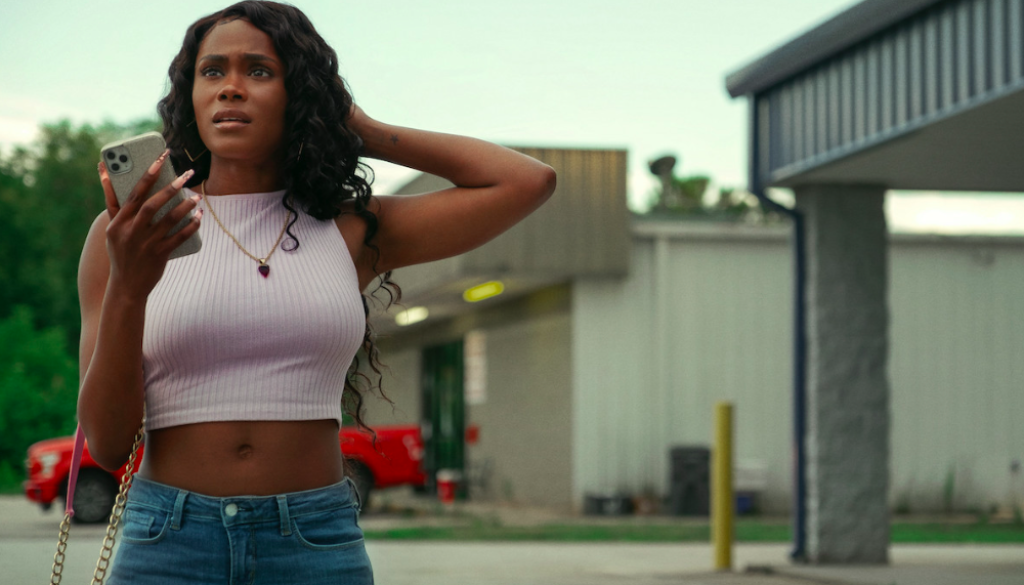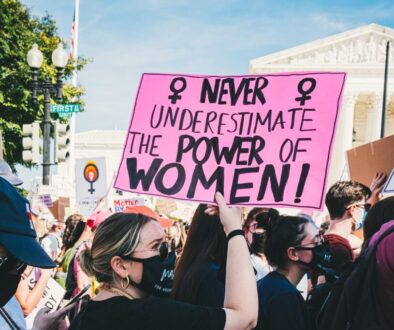3 Things P-Valley have nailed (so far) with Miss Mississippi in season 2
P-Valley is a show that follows the lives of a group of women working at an up-and-coming club called The Pynk. While the focus is on the dancers, the show also explores the relationships between the women, their families, and the men who frequent the club. P-Valley is a gritty and realistic portrayal of the strip club industry, with a focus on the African American experience. The show has been praised for its diverse cast and its frank exploration of sex work and race. If you’re looking for a new show that’s both sexy and thought-provoking, and you haven’t watched it yet, stop reading (there will be spoilers) and add P-Valley to your must-watch list.
When we first meet Keyshawn, who goes by the stage name of ‘Miss Mississippi,’ she’s just returned to dancing at the Pynk after giving birth to her second child. We soon learn that she is often covered in bruises from her abusive partner and father of her two children, Derrick. As the show progresses, we learn more about Keyshawn before she became an overnight sensation after collaborating with Lil’ Murda.
Why doesn’t she just leave?
One of the most common questions people ask about domestic violence is why the abuse victim doesn’t just leave. The answer is complicated, and there are many factors that contribute to an individual’s decision to stay in an abusive relationship. For most people, the decision is not simply a matter of leaving or staying. Instead, it is a complex mix of emotions and practical considerations.

Keyshawn leaves Chucalissa for a multi-city tour with Lil Murda, after convincing Derrick to let her join him by talking up their future, but the hope is that she’ll use those resources to get out. Frustrated viewers probably question why Keyshawn stays with Derrick, but for many victims of domestic violence, leaving the abuser is not an option because it would put them in more danger. The abuser may threaten to harm or kill the victim if they leave, or they may try to control their finances so that the victim is reliant on them. In addition, the abuser may have friends or family members who are willing to help them hurt or intimidate the victim. Another factor that can keep someone in an abusive relationship is fear. The victim may be afraid of what will happen if they leave, especially if they have children. They may worry that the abuser will take custody of the children or that they will never see their children again. They may also fear for their own safety or the safety of their family members.

In episode 5 of season 2, viewers also learn about how the pair met and got together as high-school sweethearts, and learn that teenage Derrick was violently abused by his own father. Though it’s certainly not true for all men who were subjected to violence as children, it’s not uncommon for them to grow up to become perpetuators of domestic violence. There are a few reasons why this might be the case. First, they may have never learned how to process and deal with anger in a healthy way. Second, they may have come to believe that violence is an acceptable way to resolve conflict. Third, they may have seen firsthand how their own father treated their mother and come to believe that this is the way men are supposed to behave in relationships. If you’re a man who was abused as a child, it’s important to get help processing these experiences in a healthy way so that you don’t end up repeating the cycle of violence. For a moment there, viewers likely sympathise for the couple as they realise that Derrick to was a victim— but for me, it was a rather fleeting moment that came to a sudden halt when Derrick almost burns Keyshawn’s face with an iron.
The not-too ‘Black Barbie’
Referred to by her soon-to-be manager as a “Black Barbie,” Keyshawn’s manager kickstarts her career as an influencer and lands her a number of brand deals, including a deal with an eyelash brand. While posing in front of a pharmacy poster of her lashes, Keyshawn points out that her skin has been photoshopped to look significantly lighter. In the episode “White Knights,” we learn from flashbacks of her past that colourism has always been present throughout her life, like when a footballer at her high school referred to her as a “burnt chicken nugget,” or when her step mum accidentally blurts out that her step-sisters naturally long, straight hair is “the one thing that makes her beautiful.”

Colourism is a form of discrimination that is based on the skin tone of an individual. It is often seen within communities of colour, where those with lighter skin are given preferential treatment over those with darker skin. This can manifest in a number of ways, from employment opportunities to the way people are treated by the media. While it might seem like a benign form of discrimination, colourism can have a profound impact on an individual’s self-esteem and sense of worth. It can also lead to feelings of isolation and resentment within community groups.
She blames herself for other’s wrongdoing
When she meets her manager Rome in his room for a meeting, she finds him in a bathrobe, and is informed that a pending brand deal fell through. Rome convinces her to try on a stripper heel prototype with a work outfit, before returning to the room with his penis falling out of his robe, propositioning himself. Keyshawn is visibly uncomfortable and rejects him, triggering Rome, who believes sex workers relinquish their autonomy and right to consent because of their profession. Keyshawn points out that a large part of sex work is autonomy because, at the end of the day, she is in full control, but when she attempts to leave the room as things escalate and Rome to becomes violently aggressive. After he rips her top and forces her on the bed, she is able to escape, before running into Woddy’s room, crying to him that she’s “so stupid” for trusting him (her manager.)

There are many factors that can contribute to why some women blame themselves after being taken advantage of. In some cases, it may be due to internalised sexism or self-doubt. Other times, it may be due to the way the perpetrator made the victim feel – for example, if they were manipulative or gaslighting. Additionally, some women may blame themselves because they didn’t speak up or fight back at the time, leading them to believe that they could have prevented the situation if they had only acted differently. Ultimately, it’s important to remember that no one is responsible for being taken advantage of except for the perpetrator. No matter what a person does or doesn’t do, they don’t deserve to be mistreated in any way. If you find yourself blaming yourself after experiencing something like this, it may be helpful to reach out to a therapist or counselor who can help you work through these feelings.




